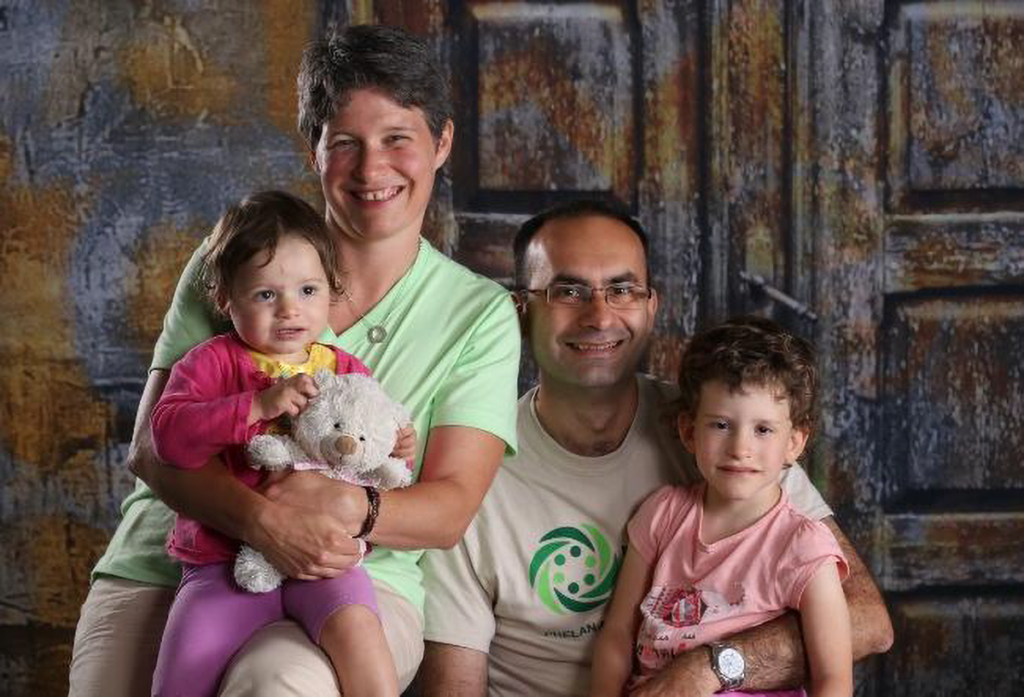
Anneli’s first cry came 8 weeks too early. We were ready to leave for our last holidays on our own as a couple; but instead of going to the airport, we went to the hospital, where after 2 days Anneli was born by cesarean cut due to a placental dysfunction. She stayed in the hospital for 68 days because of infections, blood transfusions and feeding problems. We had lots of hope and support from the medical team.
The two following years were challenging, partly because she was our first child and we had no idea of what to do or expect from her, and partly because of the frequent infections, medical visits, exams and hospitalizations. We both decided to take a gap for a year from work to stay with Anneli. We had happy moments then. We took this opportunity also to travel around a bit; an unforgettable moment is Anneli falling asleep in the backpack while hiking in the mountain jungle of Reunion Island in the Indian Ocean.
Anneli was late in all stages of development. The “offcial” reason was her prematurity, but the doctors who knew her better always suspected that there was something more. The moment of the PMS diagnosis was due to a combination of random events. Anneli has some cysts in her kidneys. In order to exclude the possibility of a genetic policystosis, her nephrologist proposed to check our kidneys. It came up that daddy also has cysts. Also at this time, we found out that a second child was coming and we panicked. Anneli’s nephrologist was away for one month so we met one of his colleagues, who reassured us but suggested to see a geneticist with whom she was collaborating. In the meantime, life continued as planned and Anneli had a small surgery to insert grommets in her ears and do an MRI. Anneli had to spend a couple of days in the hospital and the day after the surgery, daddy went to see the geneticist for the result of the tests. There is usually a lot of people waiting there, but that day he was alone. All the other appointments were cancelled in order to allow the doctor to have more time for our case. The doctor said that Anneli has a rare genetic syndrome called PMS. She had another patient with PMS so she was able explain quite a lot, but the only thing that remained of that morning was the word PMS. Then, the run back to the place where Anneli was hospitalized, thinking about how to give the news to mum.
Life had to go on (Ida arrived a few months later) and in the end nothing has really changed. Anneli is always our Anneli. However, now we can understand her better. We know some of the possible challenges that are in front of us and we try to be prepared as much as possible. With time, we got more involved in the PMS world. Last summer we also attended the PMSF conference in Orlando and it was great to meet so many other families.
In these 4 years Anneli has made huge progress. She can walk long distances more and more and she is starting to use alternative communication tools. She has already had a couple of regressions and we get very attentive to the potential signs of a new one coming. It would be great if she could overcome her hypotonia and walk normally, eat without assistance and be potty trained. These would be huge steps for her autonomy. We have heard the voice of Anneli for few days when she was a baby, but then she stopped talking; for the years to come we hope she will learn to express herself using alternative communication tools. Overall, Anneli is healthy but we fear the day will come where she will have problems like sleep disturbances or epilepsy. it would be for us to explain to the doctors. It would be great for her and the other PMS children to have regional centers of reference, which could regularly be visited and they could be monitored. This would allow collecting structured information on what is happening while ageing and could serve as contact points for doctors and parents in case of need.
We try not to think much about the far future. However, our two major concerns are the fnancial autonomy of our Anneli later in life, and how she will be as an adult. The information collected on adults with PMS is not reassuring but there is always the hope that lots of therapies and focused efforts could make a difference. Furthermore, the research on adult conditions is very limited and we hope it will increase. We have to admit we do not believe in a drug that could solve all the problems linked to PMS, but we would be ready to accept some risks for trials aiming at stabilizing our children and avoiding regressions.
